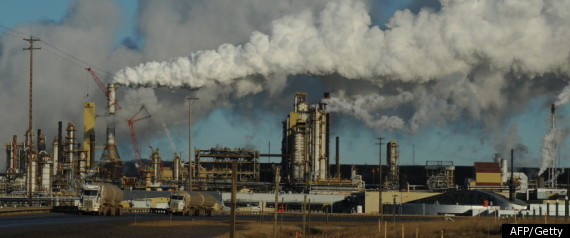 "Americans will get the jobs, Canadians will get the pollution."
"Americans will get the jobs, Canadians will get the pollution."That's the talking point a union that represents workers in the Alberta oil sands is using to oppose the construction of the Keystone XL Pipeline, the $7-billion project Transcanada Corp. is planning to build to transfer bitumen -- raw oil sands product -- from Alberta to refineries in Texas.
The Communications, Energy and Paperworkers Union of Canada (CEP) has called a press conference for Thursday where they plan to lay out in detail why they oppose a massive expansion of their industry’s infrastructure.
"The pipeline will create environmental destruction, take potential upgrading and refining jobs away from Canadians, and put our country's energy security at risk," CEP President Dave Coles said in a statement.
"The Americans will get the jobs and Albertans, Canadians will get the pollution. It is wrongheaded for the economy of Canada," Coles told the Globe and Mail.
At stake, according to pipeline opponents, are thousands of potential jobs at refineries in Alberta that will not come into existence because raw oil is being shipped to refineries in Texas instead.
"We're sending jobs down that pipeline," Gil McGowan, head of the Alberta Federation of Labour, told the Toronto Star in August.
McGowan noted that former Alberta Premier Ed Stelmach had himself been concerned about the declining proportion of Alberta oil that was being refined in the province.
"Shipping raw bitumen is like scraping off the topsoil, selling it, and then passing the farm on to the next generation," Stelmach said in 2006.
Though Stelmach set a target of 75 per cent of oil to be refined in province, the Energy Resources and Conservation Board estimates that the percentage of bitumen refined in Canada will drop from 58 per cent in 2010 to 47 per cent in 2020.
The Council of Canadians, Greenpeace and others are organizing a protest against the oil sands in Ottawa starting Monday, with at least 150 people so far prepared to emulate the peaceful resistance protests outside the White House last month that saw more than 1,200 people arrested.
Most recently, a number of Canadian celebrities have come out against the pipeline and thrown their weight behind the protests, notably Dave Thomas of SCTV fame. That follows a similar theme seen in the U.S., where actresses Margot Kidder and Darryl Hannah were both arrested at the White House protests.
Though protesters' concerns revolve around the potential of environmental damage from building a 3,200-kilometre pipeline across North America, and the particularly high carbon emissions of oil sands bitumen, a U.S. State Department environmental assessment released last month found there would be "no significant impact" to the environment from the pipeline.
(The State Department hasn’t yet given its final OK on the project, but is widely expected to do so.)
And a Canadian government report, obtained by Postmedia, discounts an environmental group's recent assertion that the pipeline could pose a health hazard because bitumen would corrode the metal faster than conventional oil, increasing the likelihood of accidents.
The Canadian government report asserted that temperatures in the pipeline would be too low for faster corrosion to take place.
But Richard Kuprewicz, an engineer at pipeline consulting firm Accufacts, told Postmedia the Canadian government report was flawed.
"I don't want to embarrass anybody, but they have no idea what they're talking about," Kuprewicz said, arguing that the presence of water in the pipeline would make it corrode faster than government estimates suggest.
Another TransCanada pipeline, which delivers oil to the U.S. Midwest and is known simply as the Keystone, has experienced 14 spills since it began operation just over a year ago, including one 21,000 gallon spill in Ludden, North Dakota.
A final decision on the Keystone XL is expected from the Obama administration by the end of the year.
Origin
Source: Huffington
No comments:
Post a Comment